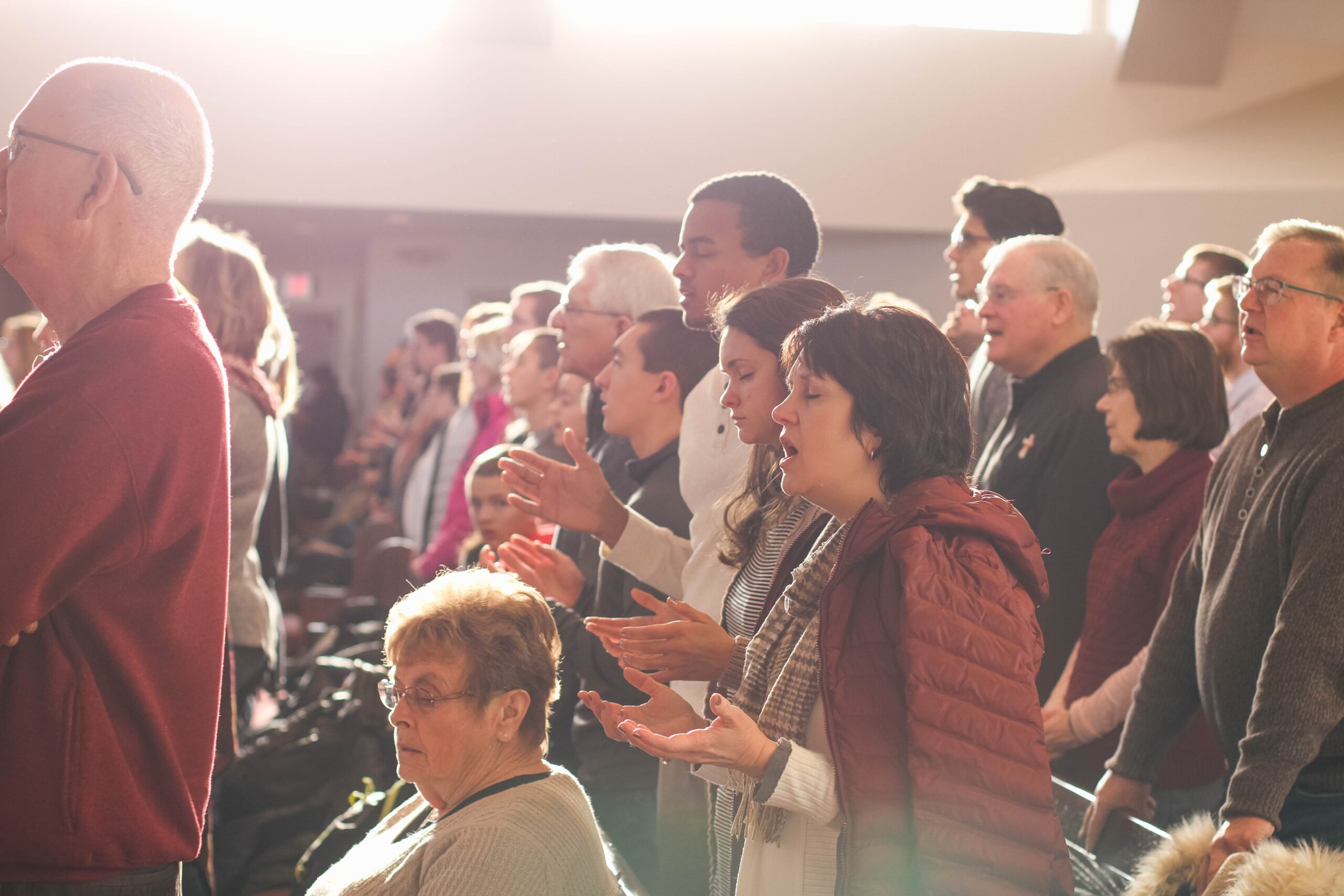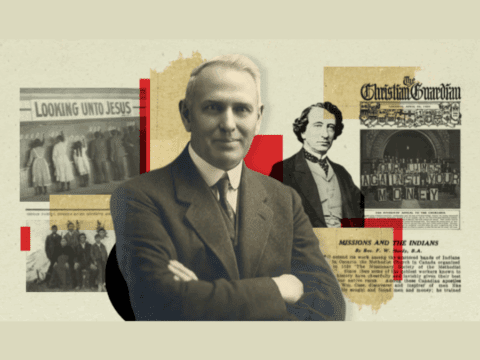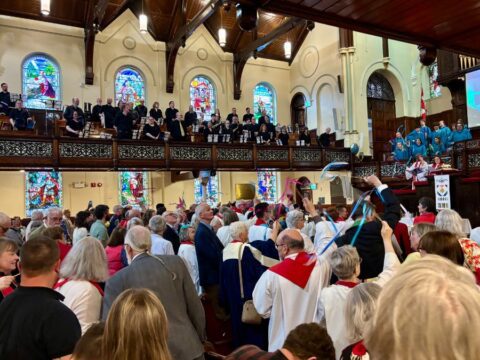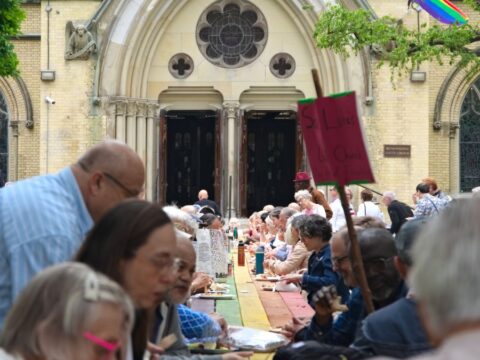1. We don’t give enough
Israel and Palestine. Human trafficking. Gambling. Sexuality. You name it, the United Church will talk about it. But when it comes to money, we clam up. We would prefer not to divulge our offering. We’d rather have a root canal than volunteer for an all-member stewardship campaign. Money talk is taboo in many churches — unless it comes to saving. Then we nickel-and-dime away board meetings and diligently guard our nest egg for a rainy day — never mind that in some cases, it’s been pouring for decades.
And tithing? Well, just don’t go there. “Tithing is taboo. My sense is that we need to talk about that, but we don’t do it very much,” says Susan Graham Walker, who holds the stewardship portfolio at the General Council Office.
It’s no secret that church givings are down. According to Statistics Canada, of the $10.6 billion that Canadians gave to charities in 2010, $4.26 billion was given to religious organizations. This represents 40 percent of the total value of donations. Yet it was down from the 46 percent recorded in 2007.
United Church givings are similarly in decline. In 2012, the General Fund of the national office showed an operating deficit of $7.1 million, which had to be funded from the reserves, reported the United Church’s Comprehensive Review Task Group last May. “Many parts of our church are experiencing scarcity as membership continues to drop, givings and assessments decline and are further eroded by inflation, givers choose to share their financial gifts with a range of organizations in addition to the church, and the investment environment continues to be challenging,” the report states.
Church needs are at a record high. The time is ripe for a discussion of tithing, a practice well documented in the early church and in the Bible.
As Graham Walker observes, when people who aren’t familiar with church start attending, “this plate comes past them, and very little is said. What do they see? Five-dollar bills. Change. An envelope. If there is an amount, it’s turned down.” She says it’s incumbent upon churches to have conversations about giving — including tithing. “You can say, ‘Give two percent and see how that feels.’ You can ask people to consider tithing a part of their budget or tithe what they spend on food in a month or tithe the amount of their coffee budget.”
Convincing congregants to tithe might be a tough sell. While 24 percent of evangelicals tithe, just eight percent of Protestants do, according to a 2008 survey of U.S. adults by the Barna Group.
“In many of our third-world sister churches, where the standard of living is far lower than ours, people still take the Bible seriously. They give 10 percent. They tithe,” writes author Ralph Milton in his 2002 book, This United Church of Ours. “I’m proud of the United Church in many ways but I’m not a bit proud of the way most of us respond with our money. In Canada, people in our denomination are among the worst in terms of giving to mission — we rank 25th out of 28 denominations. We’re 78th out of 86 in North America. That’s disgusting!”
Graham Walker isn’t stuck on the 10 percent figure, which has roots in the Book of Genesis, when Abram thanks God for a victory in battle by giving Melchizedek one-tenth of all he has. “A modern tithe is five percent, based on the assumption that when people were talking about tithing at 10 percent, that was at a point when there were no community services that we were taxed to provide. Now we pay tax,” she says.
Rev. Doug Goodwin, the executive secretary of British Columbia Conference, reflects, “When first married (and nearly penniless students), my wife and I tithed 10 percent. Funny, though, that as we earned more money, our tithe decreased. I guess there were many reasons for that, including children and greatly increased personal expenses. Truthfully, in recent years I found myself scared to get back to that 10 percent level. Part of the problem — albeit a small part — was knowing 10 percent of what? Gross income? The paycheque?” For the past decade, Goodwin has tithed 10 percent of what he receives. “I take line 260 [which indicates taxable income on federal tax forms], divide by 10 and use the pre-authorized givings method (PAR) to get that amount in monthly instalments to my congregation. I know that I am not a naturally generous person, so I appreciate the discipline and gift of the tithe.”
The congregation of University Hill in Vancouver, where Goodwin attends, also encourages tithing. “We will say, ‘We take up our tithes and our offering,’ just before the offering so tithing is mentioned. We write personal testimonies about why we tithe too,” he says. “It’s low-key, but we do encourage the practice.”
2. We have duelling identities
In a previous congregation where I served as minister, half my parishioners would boycott social justice-oriented services; the other half would complain when I didn’t level tough-enough opinions on global issues. The spiritualists and the justice seekers constantly vied for air time — Mission and Service appeals were denounced by one group, while meditative services were barely tolerated by the other. The camps were divided: worship enthusiasts in one; mission enthusiasts in the other.
This tension was highlighted a few years ago when then moderator Mardi Tindal sparred with Globe and Mail columnist Margaret Wente. In a dismissive 2012 critique, Wente wrote that from the 1960s on, “social justice was [the United Church’s] gospel. Spiritual fulfilment would be achieved through boycotts and recycling.” Tindal responded, “Most people active in the United Church (and, for that matter, in other faith groups) are engaged in daily and weekly practices of spiritual discipline, and have perhaps been too shy about publicly claiming this dimension of our lives.”
My hunch is that United Church-goers are neither the spiritually rudderless do-gooders Wente imagines nor the picture of private spirituality Tindal drew. Yet the debate underscores the friction between those who prefer to focus on spirituality over outreach and vice versa. While one needs to be grounded in the other, some congregations opt to divide and conquer. Naming the denomination’s two solitudes is taboo. While we are dwindling, we’d rather not admit this “United” church is actually divided.
“The problem with our social justice focus is we don’t do a good job of following through on why we do it, how our personal spiritual transformation leads to it,” says Rev. James Murray, a minister at Dominion-Chalmers United in Ottawa. “We reach out because we want to be nice and just, not because this is what it means to be shaped by the character of Christ. Liberals, like many conservatives, make the same mistake of pushing their political doctrines rather than the much more difficult challenge of becoming disciples of Christ.”
For Cheryl Curtis, the United Church’s Mission and Service funding officer, the problem stems from our understanding of the word “outreach.” “If the starting point of . . . being in the world [is called] ‘outreach,’ then we almost ensure unhealthy engagement. [When] doing outreach means we don’t need to be changed, or we can fix something out there and then return to our place that needs no mending, it is too one-sided.” As a church, she continues, “our call from God is to be at the margins, in the community and part of mending all that is broken. By being engaged in that, we ourselves will be mended, transformed and encounter Christ in those relationships.” To that end, the money donated to the Mission and Service Fund goes to both justice and spirituality. “Of the six areas of funding, the largest percentage goes to faith formation — creating worship resources, working with youth and young adults, intercultural ministries, stewardship education and Christian education,” says Curtis. “It’s not either-or.”
Discipleship defined as the lifelong process of becoming more and more like Jesus involves emulating all that he did: spending time in worship, praying, teaching and learning, as well as advocating for the poor and marginalized and being changed in the process.
A mature faith integrates both being and doing.
Says Murray, “It comes down to asking, ‘If the church is to be a united church, we need to ask what difference our faith makes. It’s saying, ‘I believe in God — so what?’ It’s in answering the ‘So what?’ that will unite us. We are called to care, to develop a deep personal faith and to be fearless in sharing it.”
3. We’re afraid to evangelize
The “E-word” makes some United Church-goers squeamish. “Evangelism” conjures up tent revivals, altar calls, smarmy television preachers, mind-numbing fundamentalism and religious imperialism.
But is dismissing evangelism also just convenient? Is it easier for us to talk about the good time we had at the Lions Club or the running group than it is to share the good news of the church’s impact on our lives?
Maybe the problem is that we don’t really believe we have good news to share. “Have we personally experienced the transformative and life-giving power of God in Christ? If we have, we will be motivated to share it with others. If not, we won’t,” says Rev. Greg Smith-Young of the Elora-Bethany (Ont.) Pastoral Charge. “People in The United Church of Canada are, in large part, deeply enculturated into middle-class Canadian culture, which says that talking about religion, faith and spirituality is dangerous, and trying to convince people about such things is offensive. So we will be quite ‘evangelistic’ about telling our friends to try a new coffee shop, but silent about things more significant.”
Reclaiming evangelism — if we are so inclined — may mean getting to the root of it.
In Greek, the language in which the New Testament was written, “evangelism” simply means “good news.”
“Evangelism is a willful, joyful spiritual discipline of seeing and naming the Holy Spirit at work in ourselves and those we encounter — giving voice to our own grace-filled experiences, and helping others find their voice,” writes David Gortner in Transforming Evangelism.
In a newsletter published in October 2013, the United Church’s Comprehensive Review Task Group called for a new definition of evangelism. “What if . . . we thought of evangelism as going out to where the people are with a message of love, justice, and hope? What if we thought of evangelism as going confidently and joyfully into the world and inviting people to take their faith journeys in community with us, instead of waiting for them to walk through the doors?”
Evangelism isn’t foreign to the United Church; the denomination has always had an evangelical streak. In a 2009 article for the journal Touchstone, Rev. John H. Young, a professor at the Queen’s School of Religion in Kingston, Ont., writes that his students are surprised to learn that the term “evangelism” once had a respected place in United Church vocabulary. “They are certainly surprised to be told that the three founding denominations of 1925, in the late 19th and early 20th centuries, understood themselves to be ‘evangelical’ churches.” One reason evangelism is challenging for the church, he notes, is that the over-50 crowd grew up in an era where Christendom prevailed, hence there was no motivation to talk about faith.
The fear that sharing our good news means trampling on other people’s faith is also a deterrent. Rev. Evan Smith of Toronto, who jokes that she puts the “evan” in “evangelical,” thinks that the United Church is leery of evangelism because of the history of violence that coercive evangelism has instigated.
“I think we have thrown the proverbial baby out with the bathwater. As followers of Christ, we have a responsibility to share the good news of a God of unending love, compassion and forgiveness. And when this is done right, it can offer healing and joy in a seemingly broken, hurting world. I think our task as a church is not to shy away from evangelism but to make sure that the news we share is truly good, not only to some, but to all,” she says.
Evangelism isn’t necessarily one-sided, Smith adds. “In the sharing of our story, we are not diminishing anyone else’s story. In fact, I believe we should be open to hearing others’ good news, not only as a way of connecting, but with hearts open to the possibility that God is active and at work in our world in many different ways.”
How do we flex our evangelistic muscles — or acquire some? Rev. Richard Bott, a minister at Dunbar Heights United in Vancouver, says, “We need to get comfortable with what and how we believe and with listening to what others believe and experience. We have to be open to those times when someone wants to talk about something that connects with their faith experience, always remembering that the task of evangelism is not to convert, but to share.”
Young writes that evangelism isn’t about increasing numbers. It’s “about sharing a story, a story that Christians find life-giving and transformative, in the hopes that others may find it so.”
4. Our clergy are burnt out
Maybe it’s the long, unconventional and unpredictable hours. Or the stress of dwindling, anxious congregations. Or a self-sacrificing tendency to put the needs
of others first. Or a limited emotional support system.
Whatever the case, ministry personnel are suffering, often silently. Mental illness is taboo, even more so for caregivers whose job it is to provide spiritual and emotional support for others.
The statistics are startling. A 2003 study of over 330 ministers from six denominations (including the United Church) conducted by the Toronto-based Centre for Clergy Care and Congregational Health found that ministers were nearly twice as likely to be diagnosed with clinical depression as the average Canadian.
United Church ministers fare a little better, but the picture still isn’t rosy. Among United Church ministry personnel, 6.5 percent are currently on disability; mental health issues account for 34 percent of short-term disability and 44 percent of long-term disability claims, according to Linda Begley, manager of compensation, pension and benefits at General Council.
A United Church-funded study of isolation in ministry, conducted in 2005 by the WarrenShepell Research Group, found that while United Church ministers report average levels of anxiety and emotional exhaustion, they score higher for depression (78th percentile) and stress symptoms (88th percentile). Those under age 40 suffer most on all fronts.
Rev. Christine Johnson, the minister of pastoral care at City View United in Ottawa (where I now work), was one of the statistics. She preached a sermon last October called “Claiming Our Voice,” sharing her struggle with depression. “For two years, I was on medical leave because the stress led to a complete collapse of my nervous system,” she told the congregation. “At my worst, I couldn’t get out of bed. I couldn’t eat. I couldn’t do normal household chores. I couldn’t talk without crying. I couldn’t drive.”
Johnson says her anxiety and depression stemmed from five years of bullying by a congregant in another church. “There is a silence when it comes to adult bullying. We don’t want to talk about the bullies on our doorsteps — the adults who make our lives miserable at work, at church or at the local sports facility. . . . What makes it worse in every bullying situation is when the leaders just stand by and watch it. Instead of being ‘upstanders,’ people who help you stand up to the bully, they are bystanders, watching and doing nothing to help.”
Rev. Bradley Morrison is adjunct professor at Huron University College in London, Ont., where he teaches counselling and congregational leadership courses. He says that most research into clergy burnout focuses on causes: “intrapersonal factors include clergy personality traits or interpersonal skills; systemic factors include church functioning and working conditions.” But Morrison thinks that knowing what makes ministers resilient to stress is as important as knowing what triggers it. “Supportive and caring relationships in and beyond the family are the primary protective factor. Also, I notice that ministers who have trusted and supportive colleagues and who have a place to vent and process stress can help protect against reactive and destructive responses to church stressors. Ministers who are isolated geographically, culturally or interpersonally need ways to access this collegial support.”
Recent policy and structural changes at the church’s national level are chipping away at the problem. In 2006, the United Church began a sabbatical policy, which mandates that ministry personnel may take a paid sabbatical of at least three months after five or more years of service. Ministry personnel also have the benefit of the employee assistance program, which affords access to short-term counselling. The church is currently overhauling pastoral relations and oversight and discipline policies.
“Ten Conferences are actively engaged, and a report will go to the 2015 General Council,” says Rev. Alan Hall, the church’s executive officer of ministry and employment. “All of this has been aimed at streamlining processes, improving pastoral matches, enhancing the capacities of the church to support at an earlier stage when stress in a pastoral relationship is emerging, and introducing best practices so that there are fewer opportunities for stress to accumulate and ministry personnel to burn out.”
5. We are not racially diverse
One in five people living in Canada is a visible minority. Looking at our churches, you wouldn’t know it. Congregations in the United Church are embarrassingly white.
In a recent blog post, Moderator Rt. Rev. Gary Paterson urges the church to discover what it means to be intercultural. “Nearly all of our United Churches are made up of one ethnic majority. For example, there are Korean, Chinese, Filipino, Ugandan, and Japanese congregations within The United Church Of Canada. Most United Church congregations reflect the Euro-Caucasian ethnic majority. . . . How do we make the journey to become congregations where there are no ethnic majorities?” he asks.
How indeed?
The denomination has taken various stabs at becoming more racially diverse. The United Church made a commitment to becoming an intercultural church at the 2006 General Council, and in 2012 its executive adopted a “Vision for Becoming an Intercultural Church.” Have the statements and motions made a difference?
Currently, 60 of the denomination’s 3,000 ministries are classified as “ethnic,” many established during waves of immigration. The rest are largely Caucasian.
Adele Halliday, the General Council staffperson for intercultural engagement, admits that realizing the vision at times feels slow. But the United Church isn’t alone. “I’m part of an ecumenical group consisting of staff from mainline denominations who have responsibility for multicultural or intercultural ministries. We have noticed the same dynamic. Initially, the church said, ‘Yes, we are excited,’ but there doesn’t seem to be ownership by the whole. The vision doesn’t completely stall, but it doesn’t feel like it’s moving forward quickly either. Broader, systemic issues are at work,” she says, adding that the church’s intercultural agenda isn’t just about racial identity but how we effectively engage difference.
Halliday chalks up some of the stalled vision to white privilege and the United Church’s pervasive culture of whiteness. “The culture of whiteness involves ways of being that in some ways privilege people who understand white culture. White culture has particular understandings of time, how people should speak, how a meeting is run. People growing up in a Canadian context can navigate the culture of whiteness. Our church is so entrenched in the culture of whiteness that we can’t see it. And if we can’t see it, we can’t change it,” she says.
Rev. Anthony Bailey, the minister at Parkdale United in Ottawa, agrees: “The church fundamentally won’t give up its privilege and pride of place to realize that for intercultural to flourish, there needs to be a dismantling of white privilege. The assumptions in our structures, our narratives and our liturgy are based on privilege.”
Bailey says that the word “inclusive” is fraught. “The whole business of inclusiveness is problematic because it means someone is doing the including, which means that someone has the power to include.” He adds that he has experienced racism both within and outside the church. “I have been profiled by police going home from the church. Once, I was going to do a visit. I was in a long line of cars, and an OPP [Ontario Provincial Police] cruiser passed me, stared at me, did a U-turn and followed me all the way to the house I was visiting. That’s an example of a reality that no other ministry personnel in our Presbytery experiences.”
For congregations interested in tackling racism and becoming intercultural, there is no shortage of help. Educational resources for congregational study include Sankofa: The Histories and Heritages of Black Peoples in The United Church of Canada; Our Common Vision: Becoming an Intercultural Church; and Intercultural Visions: Called to Be the Church. For those interested in classroom study, the Canadian Churches’ Forum offers a course called “Deepening Understanding for Intercultural Ministry.” An abundance of liturgical resources are also available on The United Church of Canada’s website (www.united-church.ca), including a prayer written by Alydia Smith that ends, “Compassionate One, help us to understand how racism finds life in our hearts and in our cries. In this time of tense anticipation, may we commit ourselves to be people of your way crying and creating a path for justice, equity, and peace for all people in this wilderness of hatred and racism.”
This story originally appeared in the March 2015 issue of The Observer with the title “Elephants in the room.”














